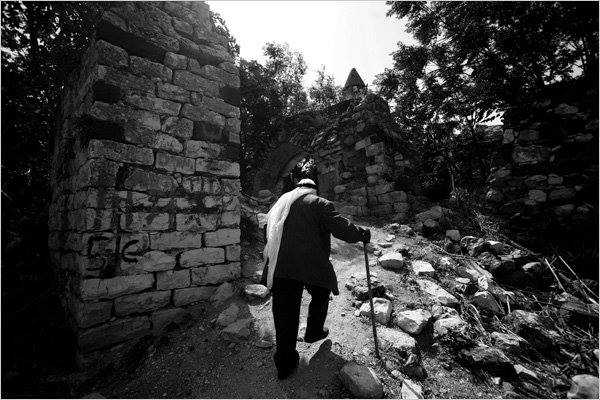
Some memories permeate our very existence and penetrate our collective consciousness for generations. Survivors of al-nakba continue to preserve these indelible memories in every wrinkle lining their faces and in every cell and fragment of bone in their bodies that continues to remember the assaults against their homes, human dignity, and existence. Each remembered grievance swims in their veins like pieces of hardened shrapnel that never dissolved in time. And while there are some things we must forget in order to heal and survive, some things we simply cannot afford to.
Survivors remember the loss of innocence that every generation to come would possess as result of the slaughter that was committed in Deir Yassin. More than any single incident in Palestinian memory, Deir Yassin continues to stand out, not because of the bloodshed or gruesomeness of this particular massacre but because of the depth of its injury. It became a haunting symbol of the Palestinian Nakba, which sparked 750,000 Palestinians to flee their homes, and the establishment of the Zionist state that was predicated on the erasure of Palestine.
Today, I don’t write about Deir Yassin to recount the details of the unspeakable horrors – the mutilated bodies, rape and theft, children slaughtered in their mothers’ arms, and bodies riddled with bullets and disemboweled by the Irgun and Haganah. Today, I remember Deir Yassin as a testament that al-Nakba is not over; that its precedent remains eternal. I remember that a sense of personal responsibility is increasingly attenuated when it comes to Palestine, and that the ongoing genocide of the Palestinian people, starting with Deir Yassin, was not just ‘allowed’ to occur.
Seventy years later, the stone homes of Deir Yassin remain standing less than one mile in clear sight of the Yad Vashem Holocaust Museum, a shrine where every known victim of Germany’s genocide is currently recorded. They stand with stubborn determination as chilling reminders of the slaughters that remain a bloodstain on the conscience of those in this world who stood by and did nothing to intervene.
The irony and hypocrisy are breathtaking.
Zionism’s legacy of state-sanctioned terror, bloodthirsty extermination, and gratuitous violence against Palestinians shamelessly lives on as official acts of state policy. Destroying the Palestinian body is not just history; it is heritage. Al-Nakba was a state of mind long before it became Zionist policy.
The continual pillaging of life, liberty, and land through the seizure and extrajudicial murders of any dissidents and the annihilation of entire families, have been viewed as neither criminal nor extraordinary for over 70 years now. But Israel has never been fully satisfied with merely holding the Palestinian people in its grip, stomping on their necks with their boots and suffocating them under occupation. Zionists and their willing executioners have systematically tried to empty Palestine of all its Arab population beginning with Deir Yassin. Palestinians are deemed an indefinable, amorphous mass of flesh that Zionist aggressors seek to reduce to nothing. Palestinians are continually shot, shamed for bleeding, and rendered completely foreign in their own land.
The acquiescence in the slow, purposeful genocide of the Palestinian people exists as ruthless megalomaniacs sleep soundly on a daily program of sanctioned mass murder, which has become an annual event. Israel has murdered at least 27 people and injured over 1,000 Palestinians in Gaza during this past week alone.
A duty to remember
And as the numbers of survivors of al-Nakba dwindles and the memory of this day begins to fade away, the significance of the archival urgency to preserve the memory is more important than ever. Survivors of massacres, including the Deir Yassin massacre, are gradually dying of old age, and there will come a time when first-hand accounts no longer exist. The fact of their existence will become as fragile as a scent in wind, and that’s exactly what Zionist aggressors seek. Today, I remember that as the old die, it is more vital than ever for the young to remember and preserve the memories with constant vigilance. To struggle for the memory of our ancestors, whose lives were not chapters and footnotes in redemptive history.
This is not a choice; it is an obligation and sacred duty.
Every time we share our narrative, the forces of denial are prepared to distort and disfigure it, and to selectively unearth the version from history that seeks to legitimize their own hegemonic interpretation and vision. They seek to silence anything contrary to their own narrative in hopes that we forget our own in time. But every time we remember and share, we continue to revive our homeland.
Our collective narrative remains our permanent record and testimony to our existence, and while our villages’ names are still spoken by tongue and through the written word, they will never be erased or exterminated. Our legacy remains preserved amid the determined sabr (cactus plants) growing and retaining seeds of resistance, in the salty scent of the sea and sweet orange blossoms of Yafa, and in the grace and elegance of the cobbled streets of Jerusalem/Al-Quds where the echoes of the chants of the athan and the chimes of church bells ring louder than the discordant beat of Israeli military boots. It thrives in the visceral resistance configured to our DNA, passed down generation after generation.
The blood of Deir Yassin courses through my veins and the veins of the child I carry – a future storyteller who will continue to imperturbably bear witness through the stories we guard as our children’s inexhaustible legacy. Generations have taken an oath, consecrated in the blood of slain mothers, butchered fathers, and asphyxiated children to ensure that the blood of the Palestinian people will not be shed with impunity or forgotten. Their sacrifice will remain forever in the souls and blood of every new life.
In the immortal words of the late Dr. Edward Said, I will continue to remember Deir Yassin because “To recall Deir Yassin is not just to dwell on past disasters, but to understand who we are and where we are going. Without it, we are simply lost.”
Filed under: Israeli Aggression, Jewish terrorism, Jewish violence, Nazi Israel, Netanyahu, Palestine, Settlements and settlers |
Related posts:
Views: 0
 RSS Feed
RSS Feed

















 April 10th, 2018
April 10th, 2018  Awake Goy
Awake Goy 


 Posted in
Posted in  Tags:
Tags: 
















